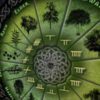This culture of the druids feels to me like Pantheism or maybe Animism? I believe the word is panentheism, pan•en•the•ism/ Noun: The belief or doctrine that God is greater than the universe and includes and interpenetrates it. In fact, the concept is similar to that described in old Judaism, poorly understood these days. In the Bible, there is a passage that goes, and I paraphrase, “In the beginning the word was with god, and the word was god.” The same concept was held by the Celtic people.
The stories they told about their gods weren’t just to relate old wives tales or anything like that. They told the stories because the stories told about those characters were the life stories of day to day mortal life. People live and experience what they do, according to the lore, because those events were originally authored by the gods themselves. The reason people weren’t all locked into fixed fates though is really pretty simple. The stories were the gods, yes, and the gods were living. The stories could change, and you could gain the favour of the gods by being the one to tell a better story.
The gods were not seen as individually omniscient, or even omnipotent. They were old and wise, but the supreme spirit was the story they told together, which is why it wasn’t to be meddled with lightly. Tell your own story well enough and you would go on to join divinity.
The Celtic deities were not of the same character as the Greek. No empire, just cosmic community. No king of the gods so much as chieftain or headman. This is even why the druids had so much influence. The Celtic leader of a tribe wasn’t an absolute “king”, and if the druids were calling his judgement into question then his tribe would begin to hold it suspect as well.
Interesting how the egalitarians were taken over by the authoritarians, but now the egalitarians are back in control for the most part. Yes, ironic no?
I won’t go into druid ritual today. Druids proper were seen as very mysterious individuals, but there were two other parts of the druid community that people saw more often.
The bards were seen most commonly, and villagers were most comfortable with them. But bards were druids also and if the visiting bard thought you a fool, that would damage your standing very badly. The bards were the story tellers and served as the “memory” of the people, educators and advisors.
Like sending out a rumor on Facebook? Yes. We do have the equivalent as we are becoming more and more a global village.
Less commonly seen, but still easier to approach than those known as druids proper, were the ovates. They were the ones who served as seers and oracles. They would be the ones who read the signs for people.
The keepers of broad prophecy, though, were the druids, and they wouldn’t appear publicly unless something seriously disruptive was happening or going to happen. Perhaps could be considered the Celtic equivalent of a Buddhist monk. They dedicated almost all their time to communing with the gods in nature.
The druids weren’t seen outside of their seasonal rituals for a reason. The villagers wouldn’t invade their groves themselves, and they would refuse to let outsiders do so also. It took conflict with Rome to change that.
There was another reason druids specifically were associated with trees. Just as trees gave fruit and shelter to the animals of the forest, it was the druids duty to give back to nature and preserve it and humanities relationship to it, sort of a reciprocal relationship with the trees.
Your thoughts are welcome. Peace between you and all your relations.
Travis Saunders
Dragon Intuitive
~science,mysticism,spirituality~



Leave a Reply